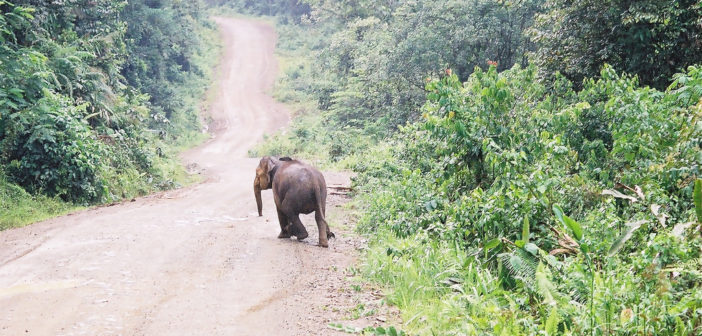Every now and then, we receive reports of orphaned Borneo pygmy elephants being rescued by the Sabah Wildlife Department (SWD). These baby elephants haven’t just gotten lost – their mothers are nowhere to be found. Twenty-two have been rescued over the past seven years, but with a high mortality rate, only half managing to survive.
All signs point to assaults on the elephants’ habitats as the cause, painting a dismal picture of the future of elephants in the state of Sabah. The exact reasons for the increasing numbers of elephant orphans have not been exactly established, but driven out of their natural habitat by human-induced factors, elephants often fall prey to all sorts of hazards. Rapid shrinkage of forest cover and large-scale encroachment on elephant corridors are the main factors behind this escalating problem.
The last decade has seen appalling destruction of forests, the fallout of which includes growing elephant depredations and rising numbers of orphans. Elephants may soon disappear because of habitat destruction and fragmentation, driven by plantation agencies, palm oil developers and logging industries.
When elephants come into conflict with man, it is a battle the gentle animals are destined to lose. While those responsible for land clearance are highly aware of encounters between elephants and humans, and the subsequent fatalities that may arise, they mostly regard the elephant as a despicable enemy. Workers have resorted to poisoning, killing, and poaching elephants. Yet a dispassionate analysis will expose humans as the ones solely responsible for this sorry situation.
Conservationists have repeatedly pointed out that the elephants are compelled to come out into the open because of shrinking habitats. The once pristine forests, home to a large number of elephants along with other flora and fauna, are now being destroyed and degraded by human activities, along with population growth.
The solution to the seemingly unsolvable human-elephant conflict lies in rectifying and undoing the wrongs of past decades. Those responsible for taking away the habitats of the elephants have to admit their mistakes, accept their faults and make a sincere resolve to dedicate their best efforts and resources towards ensuring long term habitat management.
Measures that can be taken for such management include consolidating existing good habitats, while also accounting for elephants living outside these areas. One approach is to demarcate good habitats as ‘elephant reserves’, while another is to secure elephant corridors between these habitats.
But given the rapid ravages of the land by plantation agencies, the realistic question to ponder is: is there any space left for the Borneo elephants?
Friends of the Earth Malaysia (FOEM) calls on the oil palm industry and other land agencies to rectify the situation, rather than just pay lip service to rehabilitation efforts.
Moreover, oil palm plantation companies should create and run appropriate wildlife protection and conservation programs in their concession areas, and assist the Sabah Wildlife Department to arrest workers convicted of poisoning or killing elephants.
The best way to address the problem in the short term is through better law enforcement, to show that Sabah’s wildlife laws are being taken seriously. The government and the wildlife authorities should focus their law enforcement initiatives on where deforestation is happening. Such initiatives need to be scaled up. The absence of law enforcement will only allow brutal crimes against elephants to continue, and the numbers of deaths and orphaned elephants to grow ever higher.
The right to life and the right to living space are not privileges exclusive to human beings, and space should be secured for elephants and people alike to live in perpetuity.
S M Mohd Idris
President
Sahabat Alam Malaysia
258 Jalan Air Itam
10460 Penang.
Tel : 04-2286930 Fax : 04-2286932
Featured image: baby Borneo elephant in road. Credit Cole Ford and Natasha de Vere, CC BY 2.0





